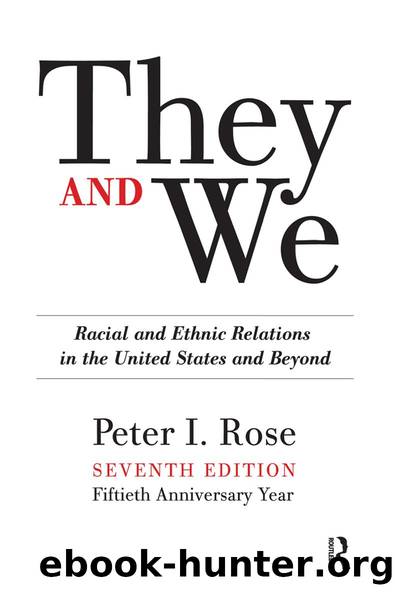They and We by Peter I. Rose

Author:Peter I. Rose [Rose, Peter I.]
Language: eng
Format: epub
Tags: Social Science, Ethnic Studies, General, Minority Studies, Sociology
ISBN: 9781594512056
Google: tMbtAAAAMAAJ
Publisher: Paradigm Publishers
Published: 2006-01-15T05:04:59+00:00
Despite denials by his brother, former president Jimmy Carter, Billy Carter seemed to echo some of these sentimentsâand those of the Ku Klux Klan of the periodâwhen he claimed that Jews had too much power and influence in America, especially in what he termed "the Jewish media."20 Others in prominent positions, including such African American leaders as Louis Farrakhan and Khalid Abdul Muhammad, made similar public utterances a few years later, signaling some resurgence of anti-Semitic populism.21
In 1969 Seymour Martin Lipset and Earl Raab published a political history of right-wing activities. In The Politics of Unreason they describe in detail the mentalities of such movements as the Anti-Masonic League, the American Protective Association of the 1890s, the Ku Klux Klan in its various incarnations, the Coughlinites of the 1930s, the McCarthyites of the 1950s, and the followers of George Wallace and other reactionary leaders in the 1960s.22 In 2001, Neil Baldwin's book, Henry Ford and the Jews, wrote of each of those eras and offered an updated examination of what, in his subtitle, he calls "The Mass Production of Hate."23
Summing up their views of those who listened to the demagogues and joined the movements, Lipset and Raab suggest that "the adherents of extremist movements have typically felt deprivedâeither they have never gained their due share or they are losing their portion of power and status. We might call these two groups the 'never-hads' and the 'once-hads.'" These deprived groups are not necessarily extremist, but extremism usually draws its strength from them.24 When the demagogue speaks, somebody listens.
Once-hads feel outraged by the thought of newcomers and outsiders getting what they believe to be legitimately theirs; never-hads seem to be particularly incensed by what they see as people demanding privileges that, they claim, they never had. In the early days of the civil rights straggle not a few white ethnics and even more poor whites in the South and many "middle Americans" were attracted by the appeals of those who blamed the blacks not only for wreaking changes throughout society and having the audacity to make demands for equality but calling for compensatory acts to make up for their harsh treatment. Some of the sloganeering of those in the Tea Party movement of late harken back to the turbulent days of the Klan when blatantly racist words were spoken from a stump or written in The Fiery Cross.25 Others linked the demands of African Americans with communist conspiracies. One of the favorite charges of the radical right in the late 1950s and early 1960s was that Daisy Bates, the president of the NAACP in Little Rock, Arkansas, who helped to bring about school integration there, and others like her, were fronting for "commies."26 Labeling of this sort and the reintroduction of classic stereotypes often stir smoldering embers of old prejudices, foment further hate, and call people to take action against their "foes." Name-calling is a widely used and highly effective form of discrimination.
Download
This site does not store any files on its server. We only index and link to content provided by other sites. Please contact the content providers to delete copyright contents if any and email us, we'll remove relevant links or contents immediately.
Chaco's Northern Prodigies : Salmon, Aztec, and the Ascendancy of the Middle San Juan Region after AD 1100 by Paul F. Reed(378)
Digital International Relations by Unknown(373)
Law Enforcement Interpersonal Communication and Conflict Management by Brian Douglas Fitch(365)
Skilled interpersonal communication: Research, theory and practice, Fifth edition by Owen Hargie(355)
The Enduring Color Line in U.S. Athletics by Krystal Beamon Chris M. Messer(352)
Critical Perspectives on Human Security : Rethinking Emancipation and Power in International Relations by David Chandler; Nik Hynek(341)
EPSO CAST Political affairs EU policies: How to succeed in the selection procedure by Franco Reverte José María(327)
Evidence-Based Policy Making in Labor Economics by Hamermesh Daniel S.;Nottmeyer Olga K.;Nottmeyer Olga;King Sarah;King Sarah;King Sarah;(319)
Writing Public Policy - A Practical Guide to Communicating in the Policy Making Process by Catherine F. Smith(297)
Criminological Theory in Context by John Martyn Chamberlain(294)
Rothschild and Early Jewish Colonization in Palestine (Geographical Perspectives on the Human Past) by Ran Aaronsohn(291)
Positive Psychology and Spirituality in Counselling and Psychotherapy (Conflict, Ethics, and Spirituality, 12) by unknow(289)
Tibeton Yoga Its Secret Doc by Evans-Wentz(283)
Threshold Concepts in Women's and Gender Studies by Christie Launius Holly Hassel(279)
Social Problems, Social Issues, Social Science by James Wright(275)
Cognitive Development in Infancy and Childhood (Elements in Child Development) by Mary Gauvain(273)
Play in child development and psychotherapy: toward empirically supported practice by Sandra W. Russ(272)
Latin American Politics and Society by Gerardo L. Munck & Juan Pablo Luna(252)
What Makes a Social Crisis?: The Societalization of Social Problems by Jeffrey C. Alexander(233)
